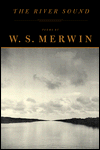
The River Sound
The River Sound W.S. Merwin Alfred A. Knopf New York 1999 134pp $23.00 0-375-40486-4
Merchandise Links
US Edition: |
It is hard to believe that The River Sound is only 134 pages long. For these are not poems that, for the most part, can be easily grasped. They must be pondered, reflecting as they do Merwin’s recurrent themes of the mysterious passage of time, the defining yet unreliable character of memory, human aspiration in the contemporary context of radical ecological destruction, the limits of language, and other essentially epistemological concerns that do not readily admit of resolution. Merwin’s poems seldom provide unambiguous conclusions. Rather, they evoke moods through which one can see oneself, and the human enterprise, in new and unexpected ways. Their shimmering, dream-like qualities compel us to examine what we think we know about ourselves and our lives. They engender worlds somewhat aslant to the one we habitually occupy.
The freshness and vitality of the poems in The River Sound is especially noteworthy from a poet now in his early seventies. The poems less represent, as one might anticipate, the culmination of a distinguished writing career — sixteen earlier books of poetry; four volumes of prose memoirs and essays; eighteen collections of masterful translations from European and Asian languages — than a revisiting of familiar themes and places with new resources of language and experience.
Also unexpected after almost fifty years since Merwin’s first publication, The River Sound poems vary more in style and tone than any of the author’s earlier collections. (This within his self-imposed convention of using no punctuation, a practice he began with his 1963 collection, The Moving Target.) Forty-three shorter poems on a wide range of topics bracket three long poems, ‘Testimony’, ‘Lament for the Makers’, and ‘Suite in the Key of Forgetting’. The first is the longest poem Merwin has ever attempted, excepting his 1998 book-length narrative, ‘The Folding Cliffs’, about the destructive incursions of Europeans and Americans into nineteenth century Hawaii. Composed of 229 8-line stanzas, ‘Testimony’ occupies almost half of the The River Sound. Here Merwin who generally depends on line breaks, syllabification, and repetition to create the background rhythm and music required for successful poetry, creates a rhyme scheme, though not one slavishly followed, of ababbcbc. To tell the story of his life in such carefully wrought stanzas and rhyme is in itself testimony to Merwin’s poetic gift.
‘Testimony’ recapitulates in verse many of the experiences, memories, and personalities recounted in Merwin’s autobiographical writings and throughout his poems. He describes again, for example, the tensions in his relationship with his distant father, a Presbyterian minister, who apparently elicited more fear than love from his son. Here, too, is a reconsideration of his mother’s last years and his relationships with and views of other family members. Friends are mentioned in their specific settings, including other well-known poets such as Galway Kinnell, a classmate at Princeton. Then there are the places he lived that left their marks on his sensibility — he shares D.H. Lawrence’s belief in the ‘spirit of place’ as expressed most directly in the early pages of Studies in Classic American Literature — from Greenwich Village to the South of France where he restored an old house, to Hawaii where has has lived these last years.
‘Lament for the Makers’ reproduces the introductory poem to the 1996 memorial anthology by that name that also includes photographs, biographical notes, and representative poems by the 23 deceased modern poets, including influential precursors like Ezra Pound and contemporaries like James Merrill, mentioned in the introductory poem. At a time when the written word is besieged (several poets of my acquaintance had never heard of Merwin!), ‘Lament’ is an exercise in cultural preservation. This poem is also rhymed and is surprisingly light-hearted given its serious subject. It is comprised of 52 quatrains with the (again not always strictly followed) rhyme scheme of aabb. All of the stanzas end with ‘me’ as the final rhyme. Two representative stanzas will help convey the poem’s flavor
I dreamed that Auden sat up in bed(Curiously, ‘Lament for the Makers’ is also the title of a 1961 collection and poem by the late San Francisco poet, Jack Spicer.)
but I could not catch what he said
by that time he was already
dead someone next morning told meand Marianne Moore entered the ark
Pound would say no more from the dark
who once had helped to set me free
I thought of the prose around me.
‘Suite in the Key of Forgetting’ is more difficult to parse; except for its relative length, it is more like the main corpus of Merwin’s work in the lack of a transparent narrative or message. As best I can ascertain it concerns the loss of a medieval manuscript. In this it can perhaps symbolize the major leitmotif of Merwin’s work. For he is the poet of loss. The postmodern T.S. Eliot, writing in a period when the wasteland has become the dominant reality, his work echoes with currents of absence and the loss of people through death or simply changing circumstance, of local cultures through external intrusions, of natural landscape through human depredations. In an age of loss on every side, the loss of biological, cultural, and experiential diversity, no poet has more to offer us than W.S. Merwin. We can only begin the work of salvage or restoration by understanding the full extent of what we have lost and are losing. And here we have no more eloquent witness than W.S. Merwin.
Reviewed by Jerry Bass
